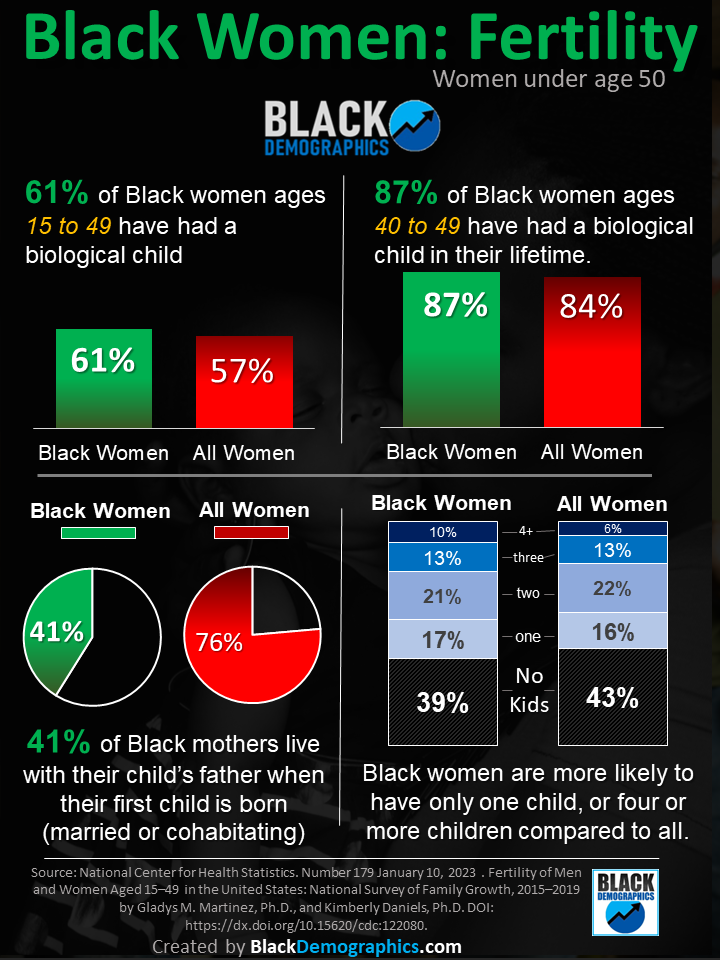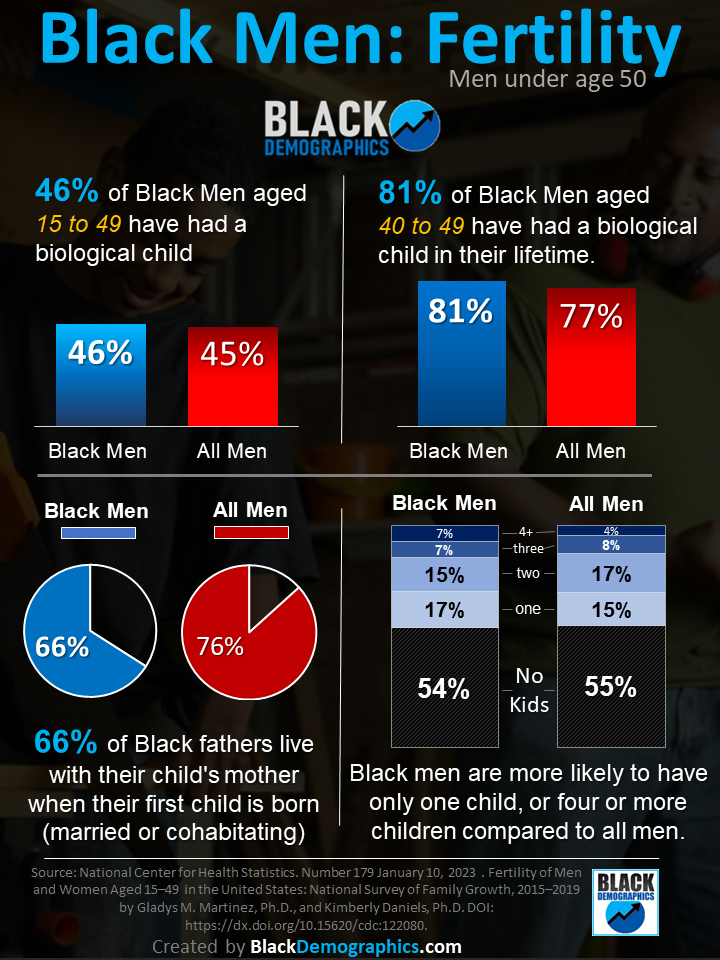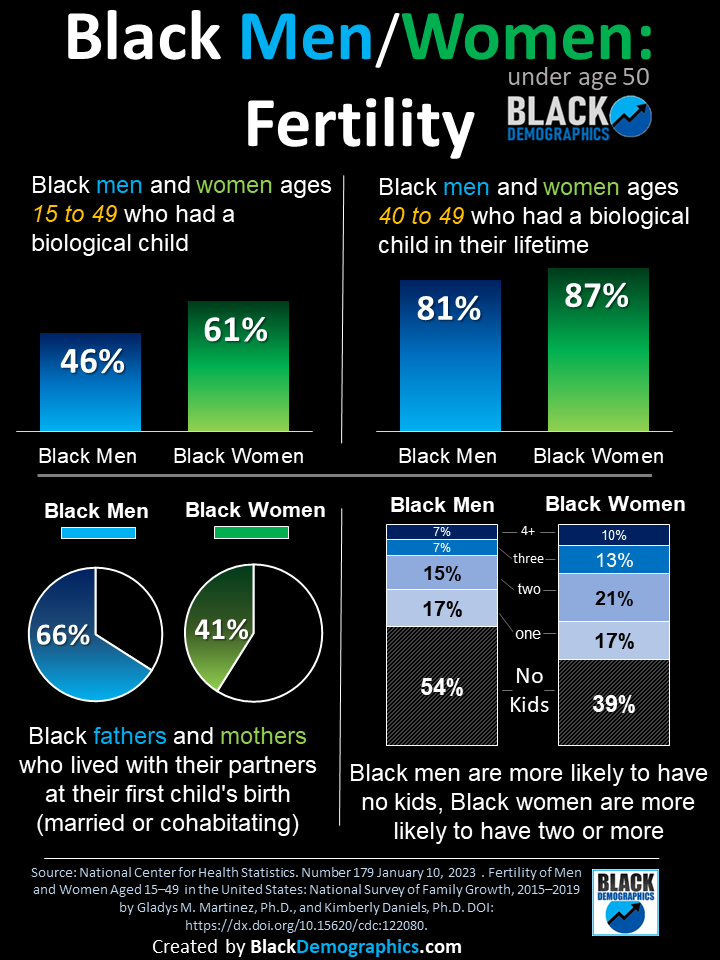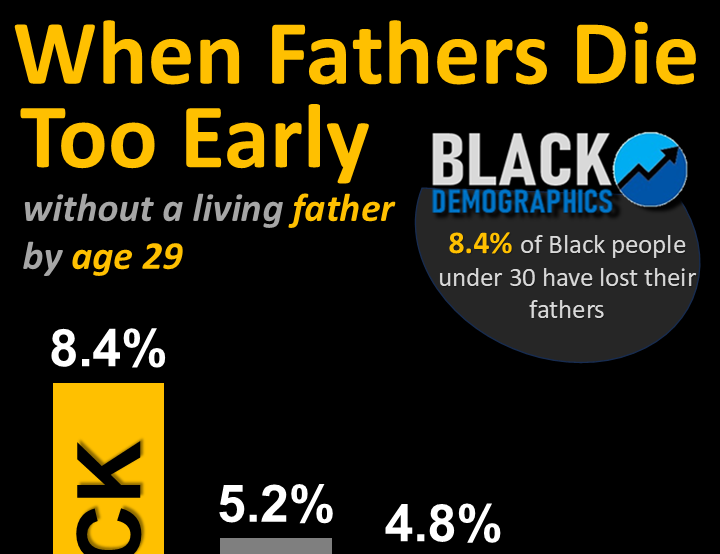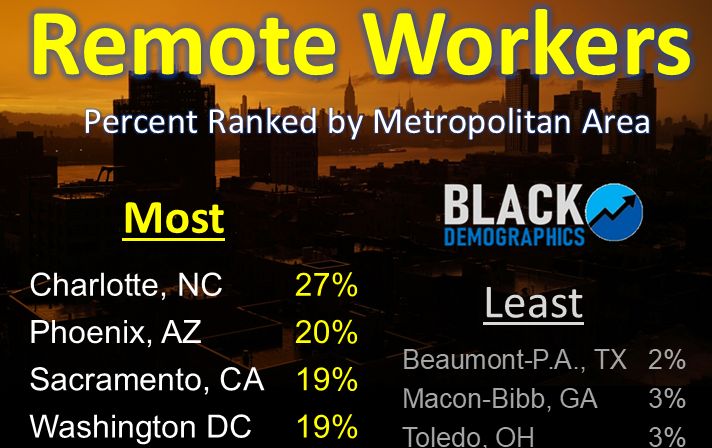The Birth of New Black Families
Every birth of a woman’s first child is a potential start of a new Black family, adding to the community’s Black Demographics. These families result from the choices of two consenting people, regardless of their age, living situation, or financial status.
Analysis of fertility data among Black men and women from a recent 2023 report from the National Center for Health Statistics using data collected between 2015–2019 provides valuable insights into Black families. These are some of the observations made by BlackDemographics.com.
Black Women and Their Path to Motherhood
About 61% of Black women aged 15-49 had a child, a slightly higher than the 57% average for all women who have given birth. For those aged 40-49, the rate increased to 87%, also slightly higher than all women at 84%. Unlike the general population,
Black women in the same age group were slightly more likely than all women to have either “only one” or “more than four” children than women in general. At the time of birth, 41% of Black mothers were living with their child’s father, compared to 76% of all mothers. Black women were much more likely to have their first child before age 25 and wait longer before having a second.
Black Men’s Role in Parenthood
Also according to the report around 46% of Black men aged 15-49 were fathers, slightly more than the average. By their 40s, 81% of Black men had children, more than other men but less than women in general.
Black fathers in the same age group were slightly more likely to have either “only one” child or, like Black mothers, have more than four. Sixty-six percent of Black fathers lived with their child’s mother at birth, more than Black mothers but less than the overall male average.
Comparing Black Men and Women
There are some important factors to keep in mind about the Black community’s family patterns.
NOTE -2/19/2025: These statistics reflect self-reported data from the National Survey of Family Growth (NSFG). Research has shown that men are more likely to underreport children they do not live with, which may result in some underestimation of fatherhood rates. The data is weighted for accuracy, but no survey is perfect. These trends should be used to inform discussions, not to assign blame.
- There are over 307,000 more Black women than men.
- Despite this, there are more than 550,000 married Black men than Black women.
- Black men are twice as likely to marry outside their race than Black women.
- Also, according to the report there were 1 million more Black women with children than Black men
46% of Black men aged 15-49 had a child, compared to 61% of Black women. By their 40s, these figures were closer with Black men at 81% and Black women at 87%. Black women were more than twice as likely to become mothers before the age of 25, and Black men were twice as likely to become fathers after age 25.
This led to the higher likelihood of young Black mothers with children from men in older age brackets and supports the statistic that Black men were more likely to live with the mother of their firstborn child. This difference influenced family dynamics, and also explains why mothers who had their first child at a young age were more likely than all women to have a child with a different partner when they got older. .
NOTE -2/19/2025 –Does This Data Mean Black Women actually Have More Children Than Black Men?
“Not necessarily. The NSFG data is based on self-reported responses. Studies show that men, particularly those who do not live with their children, are less likely to report fatherhood. This means the actual number of Black fathers may be slightly higher than reported. However, the overall trends remain useful for understanding broader fertility patterns. “”
Beyond Birth Statistics: Family History and Socioeconomics
The report revealed more. In general women and men who grew up living with both parents at age 14 were much less likely to have children outside of marriage.
Women and men of all races whose mothers attained higher education were also less likely to have children outside of marriage.
Socioeconomic status mattered too; lower-income women of all races were the most likely to give birth by age 20.
A Path Forward
These insights can be viewed as a call to action. Understanding these factors can lead to better support, family planning, and policies. It’s about starting conversations that lead to POSITIVE change, ensuring all Black parents and children are valued and supported.
Source: National Center for Health Statistics. Number 179 January 10, 2023 . Fertility of Men and Women Aged 15–49 in the United States: National Survey of Family Growth, 2015–2019 by Gladys M. Martinez, Ph.D., and Kimberly Daniels, Ph.D. DOI: https://dx.doi.org/10.15620/cdc:122080


